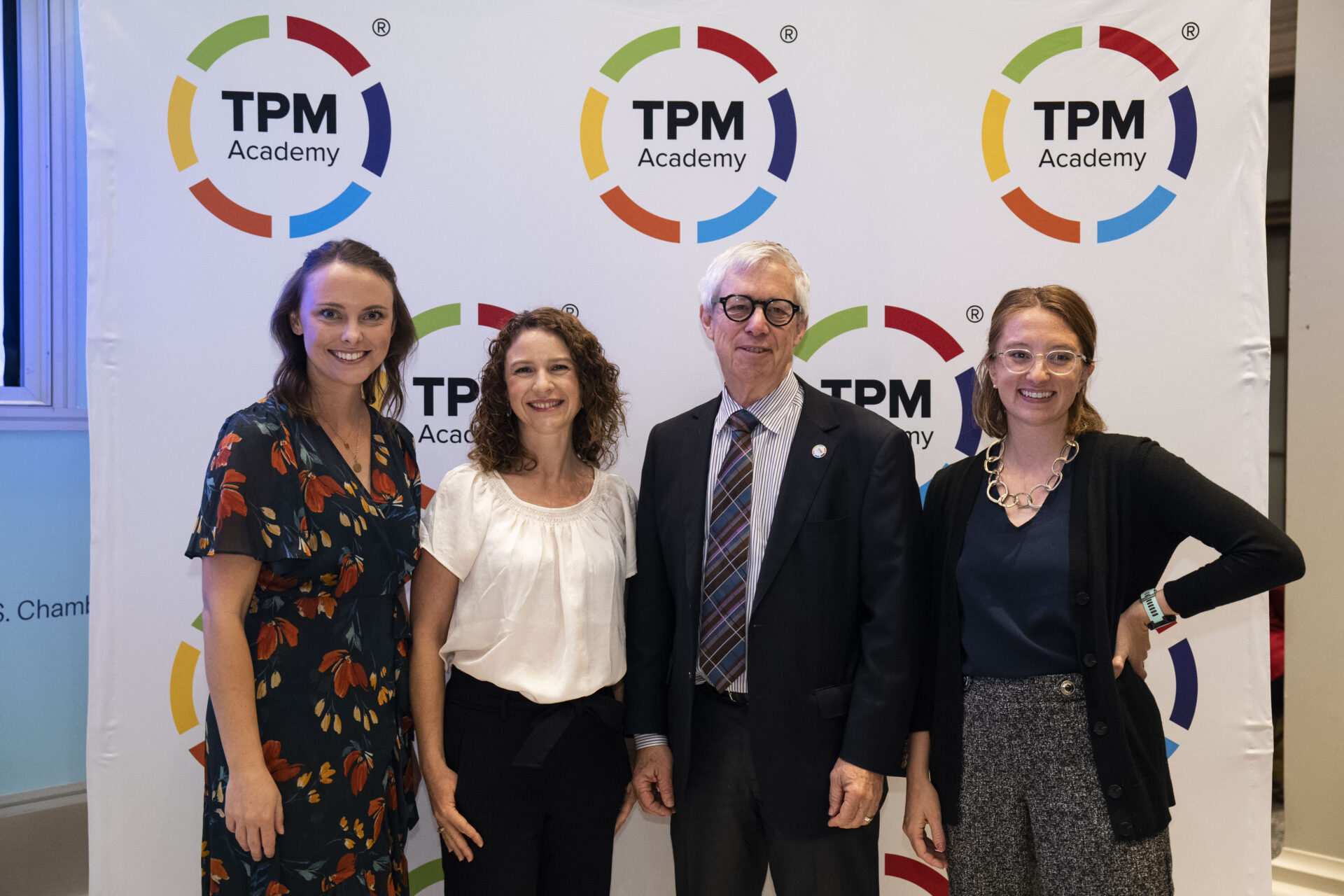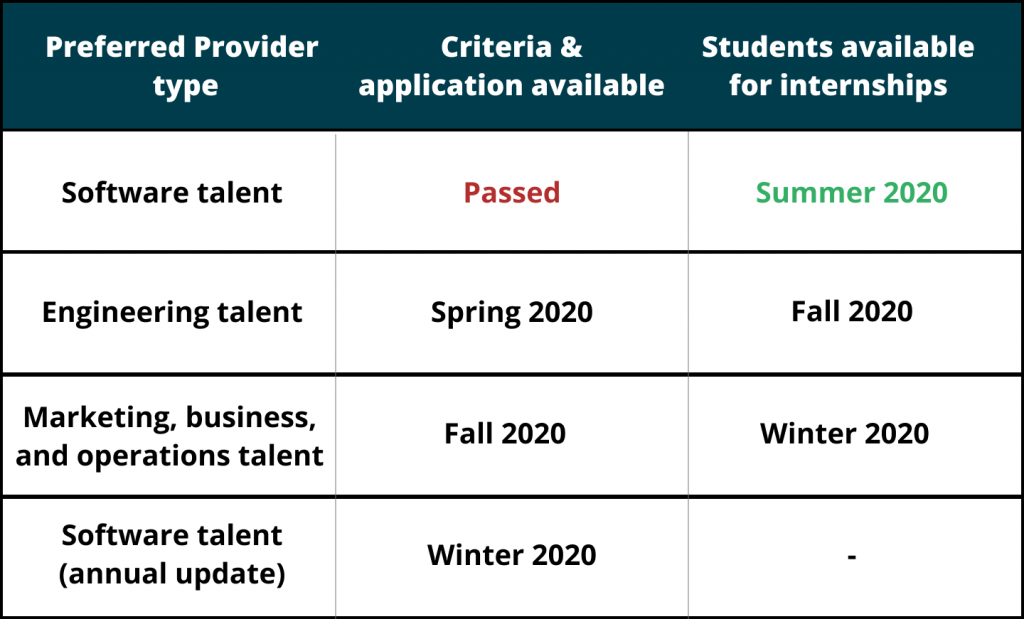As total student debt continues to climb in the United States, and the hope that some would see relief fades, the need for new and more affordable approaches to training and education grows. In San Diego, it is projected that 84 percent of new jobs created by 2030 will require some sort of post-secondary education. However, restricted access to formal higher education means there will not be enough people to meet employer demand. This is compounded by San Diego’s increasing reliance on (and leadership in) intellectual property and technology that changes faster than curriculum can keep pace with.
It’s clear the days of leaning entirely on traditional education systems to prepare the entire economy’s workforce are behind us, and yet the demand for talent with the skills and educational training necessary to perform complex tasks such as research and development still very much exists. Jobs in the innovation economy are high-paying, resilient, and each one supports two jobs elsewhere in the economy. These jobs are critical to San Diego’s story, so companies must be creative about what this new age of recruitment and workforce preparation looks like.
There is a science to knowing how many skills and competencies a new hire should have learned from a training program, and how much training a company should expect to build into onboarding. The equation to find out exactly where that line is being drawn is called Talent Pipeline Management® (TPM).
An employer-led, data-driven approach.
San Diego Regional EDC’s alignment with the TPM framework is rooted in shared values around being authentically employer-led and data-driven. With between 75,000 and 85,000 monthly job postings and an average of just 59,000 unemployed San Diegans each month to fill them, San Diego (along with the rest of the nation) faces a talent shortage. This is the business case for changing the way we develop talent in the region.
“TPM leverages lessons learned from supply chain management, strategies, and tools to help employers and employer associations play the role of an end-customer in a talent supply chain.”
–U.S. Chamber of Commerce Foundation

How EDC uses the framework.
Since 2019, EDC and its partners have worked together to convene multiple Employer Working Groups (EWG), made up of more than 70 companies from across industries, to lead in the reshaping and development of talent pipelines in our region.
The TPM framework is broken down into the following six strategies. This is how EDC leverages each one to build talent in our region:
- Organize for employer leadership and collaboration: Create a collaborative that organizes employers to identify the most promising opportunities for engagement around similar workforce needs.
Leveraging EDC and partner networks, we convene five to 10 companies to discuss talent needs that persist across industry. Company representatives including hiring managers, recruiters, or talent acquisition specialists are invited to attend meetings focused on occupations in their industries.
- Project critical job demand: Develop projections for job openings to determine with accuracy the type of talent and how much of it employers need.
Using labor market information and existing job postings, EDC builds an outline of predicted needs, then shares those predictions with the EWG to see how it resonates with current industry trends. Predicting labor market trends is a useful tool, however it lacks the day-to-day insight of industry knowledge and growth potential. Labor market information also fails to highlight correlating factors that might be contributing to a weak talent pipeline such as retention challenges in a potential feeder role, or misaligned incentives between training programs and employers. Talent needs are better understood when all of this information comes together. Each EWG member is asked to respond to a survey to quantify hiring expectations in a few key roles over the next three to five years.
- Align and communicate job requirements: Create a shared language to better communicate competency, credentialing, and other hiring requirements of critical jobs in ways that allow employers to signal similarities and differences.
As decisions are made for occupations that are most in need of an improved talent pipeline, EDC use current job postings and existing skill frameworks to start building a list of the necessary skills. Employers help to create a shared definition of skills and determine which should be taught in a classroom and which are best suited to learn on the job. This often serves as an opportunity for companies to better understand their own skill requirements and broaden the pool of talent they recruit from. Using this data, EDC produces a Talent Demand Report outlining critical findings and providing guidance for how training providers can improve curriculum to meet industry needs.
- Analyze the talent supply: Identify where employers historically source their most qualified talent and analyze the capacity of those sources—as well as untapped talent sources—to meet projected demand.
EDC provides a platform for local education partners to showcase how they are training to the skills needed, as well as how they are reaching and serving a diverse student population. This approach allows for a fresh look at all training providers in the region, setting aside rankings and accolades to focus on how students are being prepared for quality jobs. In the past, this exercise has led employers to recognize occupations that don’t need a bachelor’s degree, because more accessible associate’s degree or even certificate programs proved to be adequately teaching the skills needed.
- Build talent supply chains: Manage the performance of talent supply chains to create a positive return on investment for all partners.
EDC and core partners continue to work hard to build a workforce and talent pipeline with a stable network of private companies, educational institutions, and community organizations. Identifying the major barriers that limit growth and how this network is equipped to assist in lessening those hurdles remains key in shaping a San Diego for all.
- Apply continuous improvement: Use data from the talent supply chain to identify the most promising improvement opportunities to generate a better return on investment in the future.
Continuous improvement is applied on multiple levels as the programs that use TPM continue to iterate and scale. Whether uncovering a need to improve student preparation for entry-level certification exams, adjust work-based learning opportunities, or any of the other lessons learned over the last four years, EDC and its partners are committed to continuously improving talent pipelines and moving the region closer to its skilled talent goal.
By assessing training providers based on pre-determined employer-set standards, the reliance on historically inaccessible sources of talent is eliminated, opening the aperture for both companies looking to find more diverse, qualified candidates, and for San Diegans preparing for quality jobs in the region.
A TPM case study
In 2020, EDC and Talent Forward, a U.S. Chamber Foundation initiative, released a case study on how the region had been using TPM to reach its goal of doubling the number of skilled workers each year.
“The U.S. Chamber of Commerce Foundation is grateful to learn alongside partners like San Diego Regional EDC as it implements the TPM framework. For the past several years, EDC has demonstrated that employers can lead change management to build high-performing talent pipelines. These efforts have positively impacted so many in the San Diego region: companies, education and training partners, and most importantly, students and workers. We will continue to tout these tremendous achievements and are excited for all that is in store.”
– Jaimie Francis, Vice President of Policy & Programs for the Center for Education and Workforce at the U.S. Chamber of Commerce Foundation
Leading partnerships for the region.
Today, TPM continues to play an important role in San Diego’s talent development strategies. As the original Advancing Cities funding sunsets, public, private, and philanthropic investments allow the work to continue. EDC partnered with the San Diego Workforce Partnership and CCOE to use TPM to guide CyberHire and other future programs.
Thanks to the leadership of the Grossmont-Cuyamaca Foundation and the San Diego and Imperial Valley Community College Consortium, TPM is a leading feature of the Border Region K-16 Talent Pipeline Collaborative where the impacts of the framework will continue to expand.
If you are an employer, education provider, or convening organization interested in learning more about TPM, contact:

Taylor Dunne
Director, Talent Initiatives

